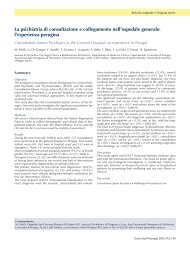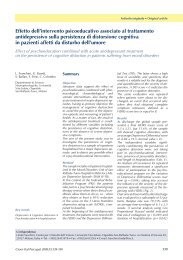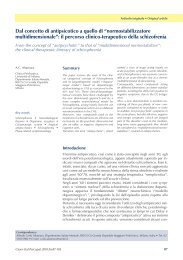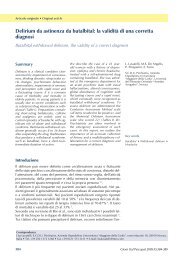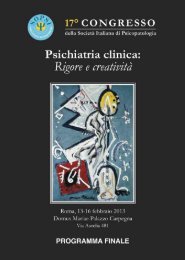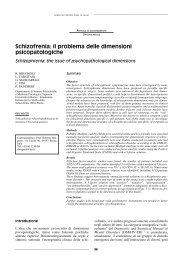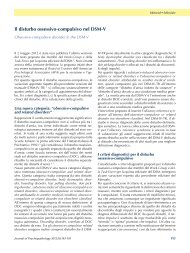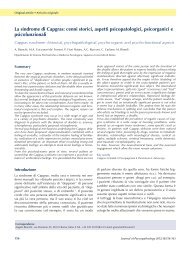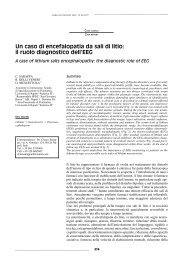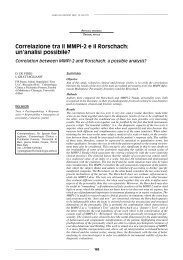XI Congresso della Società Italiana di Psicopatologia Psichiatria ...
XI Congresso della Società Italiana di Psicopatologia Psichiatria ...
XI Congresso della Società Italiana di Psicopatologia Psichiatria ...
You also want an ePaper? Increase the reach of your titles
YUMPU automatically turns print PDFs into web optimized ePapers that Google loves.
23 FEBBRAIO 2005 - ORE 14.15-15.45<br />
SALA ELLISSE<br />
S31 - Uso <strong>di</strong> cannabinoi<strong>di</strong> e psicosi:<br />
un’epidemia silenziosa<br />
COMT Val 158 Met moderation of cannabisinduced<br />
effects on psychosis and cognition<br />
C. Henquet, J. van Os<br />
Department of Psychiatry and Neuropsychology, Maastricht<br />
University<br />
Introduction: epidemiological reseach has suggested that a<br />
functional polymorphism in the Catechol-O-Methyltransferase<br />
(COMT Val 158 Met) gene moderates the psychosis inducing<br />
effects of cannabis. To replicate this fin<strong>di</strong>ng using an<br />
experimental design and to extent it to the complex world of<br />
daily life, experimental exposure procedures and momentary<br />
assessment methodology were applied to test for geneenvironment<br />
interactions within the cannabis-psychsis relationship.<br />
Methods: a double blind, placebo-controlled cross-over design<br />
was used in which genotyped in<strong>di</strong>viduals at low and<br />
high risk of schizophrenia were exposed to ∆-9-THC<br />
(THC). Moment-to-moment experiences associated with<br />
cannabis in the flow of daily life were furthermore assessed<br />
in an experience sampling study. COMT Val 158 Met moderation<br />
of cannabis-induced effects on psychosis and cognition<br />
was then investigated using multilevel random regression<br />
analyses.<br />
Results: carriers of the Val allele were most sensitive to<br />
THC-induced effects on psychosis, however this was con<strong>di</strong>tional<br />
on prior evidence of psychometric psychosis liability.<br />
THC impacted negatively on cognitive measures. Carriers<br />
of the Val allele were also more sensitive to THC-induced<br />
memory and attention impairments compared to carriers of<br />
the Met allele. In the flow of daily life, cannabis appeared to<br />
be associated with hallucinatory experiences con<strong>di</strong>tional on<br />
COMT Val158Met genotype.<br />
Conclusion: these fin<strong>di</strong>ngs provide confirmatory evidence<br />
that COMT Val 158 Met genotype moderates the effects of<br />
cannabis on the occurrence of positive psychotic symptoms.<br />
Cannabis may be causally associated with psychosis,<br />
but it is increasingly apparent that any causal contribution<br />
is con<strong>di</strong>tional on a number of moderators reflecting underlying<br />
gene-environment and possibly gene-gene interactions.<br />
Cannabis use and psychotic <strong>di</strong>sorders:<br />
an update<br />
F. Nicoletti, F. Matrisciano<br />
Department of Human Physiology and Pharmacology, University<br />
of Rome “La Sapienza”<br />
The cannabis plant has been cultivated for centuries both<br />
for the production of hemp fiber and for its presumed med-<br />
MODERATORI<br />
G. Bersani, F. Nicoletti<br />
81<br />
SIMPOSI TEMATICI<br />
icinal and psychoactive properties. The smoke from burning<br />
cannabis contains many chemicals, inclu<strong>di</strong>ng 61 <strong>di</strong>fferent<br />
cannabinoids that have been identified. One of<br />
these, ∆-9-tetrahydrocannabinol (∆-9-THC), produces<br />
most of the characteristic pharmacological effects of<br />
smoked marijuna.<br />
The pharmacological effects of THC vary with the dose,<br />
rout of administration, experience of the user, vulnerability<br />
of psychoactive effects and setting of use. Intoxication<br />
with marijuana produces changes in mood, perception and<br />
motivation.<br />
The effects vary with dose and produce impairment of<br />
cognitive functions, perception, reaction time, learning<br />
and memory. Marijuana also produces complex behavioural<br />
changes, such as gid<strong>di</strong>ness and increased hunger. Unpleasant<br />
reactions such as panic or hallucinations and even<br />
acute psychosis may occur.<br />
While there is no convincing evidence that marijuana can<br />
produce a lasting schizophrenia-like syndrome, there are<br />
precipitate a recurrence in people with a history of schizophrenia.<br />
A cannabinoid receptor has been identified in the<br />
brain and cloned. An arachidonic acid derivative has been<br />
proposed as an endogenous ligand and named anandamide.<br />
While the physiological function of these receptors<br />
or their putative endogenous ligand has not been fully<br />
elucidated, they are widely <strong>di</strong>spersed with high densities in<br />
the cerebral cortex, hippocampus, striatum and cerebellum.<br />
Recent investigations of patients with schizophrenia<br />
found increased density of cannabinoid receptors in the<br />
dorso-lateral prefrontal cortex and the anterior cingulate<br />
cortex. Several genetic stu<strong>di</strong>es have reported an association<br />
between genes enco<strong>di</strong>ng the cannabinoid receptor and<br />
schizophrenia.<br />
Thus, an alternative explanation of the association between<br />
cannabis use and schizophrenia might be that<br />
pathology of the cannabinoid system in schizophrenia patients<br />
is associated with both increased rates of cannabis<br />
use and increased risk for schizophrenia, without cannabis<br />
being a causal factor for schizophrenia. Several authors<br />
show that young consumers and previous consumers have<br />
higher scores in schizotypy, borderline and psychoticism<br />
scales. They also show deficits in attentional inhibition<br />
and decreased reaction time. The causal relationship of<br />
this association is not yet clear but cannabis consuption<br />
modulates dopamine concentrations, may induce reversible<br />
acute psychosis and it may induce the manifestation<br />
of schizophrenic psychosis in vulnerable patients<br />
(“dopaminergic stress”).<br />
References<br />
1 O’Brien et al., 1997.<br />
2 Hall et al., 2004.<br />
3 Drewe et al., 2004.



